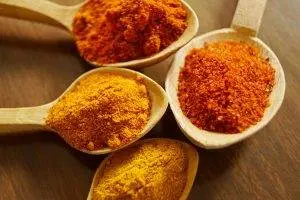by Qineng Tan, L.Ac., Ph.D. and Xiaomei Cai, L.Ac., Ph.D.

Abdominal pain, bloating, diarrhea? These can be SIBO symptoms. SIBO, or small intestinal bacterial overgrowth, can cause bloated stomach, abdominal cramps and pain. Acupuncture and TCM can offer alternative SIBO treatment and bloating relief.
Small Intestinal Bacterial Overgrowth (SIBO) is a condition in which an abnormal increase in the population of bacteria occurs in the small intestine.
Unlike the large intestine, which is rich in bacterial flora essential for digestion and immune function, the small intestine typically contains relatively few bacteria. When these bacteria proliferate excessively in the small intestine, they can disrupt normal digestion and nutrient absorption, leading to a variety of uncomfortable and sometimes debilitating symptoms.
Problems with gut motility also contribute to SIBO symptoms. Peristalsis is the process by which the smooth muscle tissues in the intestine move food matter through the gastrointestinal tract. When peristalsis isn’t happening the way it should, this is known as dysmotility. This can lead to stagnation of food matter in the intestine, which allows for an overgrowth of bacteria to build up. This in turn can causes hydrogen and methane gas to be produced by the fermentation of carbohydrates that are stagnant in the small intestine. This excess gas causes painful bloating and distension of the abdomen.
SIBO can cause a range of digestive symptoms, such as bloated stomach, abdominal pain, diarrhea, constipation, and malabsorption of nutrients from food, which can result in unwanted weight loss and nutritional deficiencies. Vitamin B12 deficiency is particularly common among people suffering from SIBO.
Other symptoms, seemingly unrelated to the gastrointestinal system, can include: fatigue, headache, low fever, and rosacea.
SIBO is often associated with other health issues, including irritable bowel syndrome (IBS), celiac disease, and diabetes.
Acupuncture and TCM can work as an adjunct or alternative treatment for SIBO symptoms.
This can lead to hydrogen and methane gas being produced by the fermentation of carbohydrates that are stagnant in the small intestine. This excess gas can cause painful bloating and a distended abdomen.
What Causes SIBO?

A wide variety of different issues can play a role in the development of SIBO. Many conditions may cause problems with the secretion of gastric acids, with motility of the small intestine, gut immune function, and structural issues related to surgeries, injuries, or other abnormalities of the intestine.
Conditions that may contribute to SIBO include:
- Gastroparesis due to diabetes, or connective tissue disorders, viral infection, or ischemia
- Cirrhosis
- Chronic renal failure
- Scleroderma
- Crohn’s disease
- Celiac disease
- Recurrent rounds of antibiotics
- Excessive consumption of alcohol
- GI tract surgeries that create structural abnormalities
- Immune deficiencies of T-cell or antibody responses
What’s the Difference Between IBS and SIBO?
Symptoms of SIBO are very similar to IBS symptoms, and it is possible for a person to have both IBS and SIBO at the same time. The difference between SIBO and irritable bowel syndrome is that IBS is a functional syndrome stemming from issues in the large intestine, whereas SIBO occurs in the small intestine.
One review of studies showed that the incidence of SIBO among patients with IBS is much higher than among people who don’t have IBS symptoms. The exact link between IBS and SIBO has not yet been clarified by medical science.
Medical Treatment for SIBO
In Western medicine, the treatment of SIBO typically involves a multi-faceted approach aimed at reducing the bacterial overgrowth, addressing the underlying causes, and managing symptoms.
Along with trying to find and address any underlying conditions that may be causing or contributing to SIBO, the mainstays of conventional treatment include antibiotics and medications to help improve gut motility.
The primary treatment for SIBO is the use of antibiotics to reduce the bacterial load in the small intestine. Commonly prescribed antibiotics include rifaximin, metronidazole, and ciprofloxacin. These antibiotics are chosen for their ability to target the small intestine bacteria while minimizing disruption to the rest of the gut microbiota.
Unfortunately, while antibiotics may help reduce bacteria, but they can also come with unwanted side effects. Rifaximin can cause bladder pain, urinary frequency, difficulty urinating, and cloudy urine. It can also contribute to feelings of anxiety, dizziness, headaches, fast breathing, fast heartbeat, and problems sleeping.
Antibiotics do not necessarily ease symptoms like gas and bloating, and can cause constipation and black, tarry stool.
Prokinetics are medications that help improve gut motility, ensuring that food and bacteria move efficiently through the digestive tract, which can help prevent bacterial stasis and overgrowth. Common prokinetics include erythromycin in low doses, prucalopride, and metoclopramide.
Dietary modifications will usually be recommended to help manage SIBO. Patients are often advised to follow specific diets such as the low FODMAP diet, which reduces the intake of fermentable carbohydrates that can feed bacterial overgrowth. Other dietary approaches may include the Specific Carbohydrate Diet (SCD) or an elemental diet, which involves consuming easily digestible, nutrient-rich formulas.
It can be difficult for people to follow a SIBO diet, and many physicians are not able to spend the time with patients that is required to properly support these behavioral changes. Without dietary support, the antibiotics and prokinetics may not do enough to get rid of SIBO.
Successful treatment of SIBO often requires addressing any underlying conditions that contribute to bacterial overgrowth. This could involve treating gastrointestinal motility disorders, managing chronic pancreatitis, or addressing structural abnormalities such as strictures or diverticula.
By understanding the underlying causes and employing a comprehensive treatment strategy, conventional medicine aims to alleviate symptoms and reduce the recurrence of SIBO. However, due to the chronic nature of the condition and the complexity of the gut microbiome, many patients seek complementary treatments such as acupuncture and herbal medicine to support their overall gut health and enhance the effectiveness of their treatment plan.
Can Acupuncture Help SIBO?

Chinese herbal medicine has its own way of helping to relieve SIBO, improve motility and digestion, and soothe uncomfortable stomach pain and bloating.
TCM theory views stagnation of Qi and blood as being one of the primary pathogenic forces in the body that causes pain and disease. In the case of SIBO, weakness or stagnation of organ systems, such as the stomach, liver, and spleen, is often part of the diagnostic pattern.
Diet, herbs, and supplements may all play an important role, in addition to acupuncture treatment for SIBO. Digestive enzymes and/or probiotics may be helpful in some cases. It may be necessary to eliminate some foods for a time to help control excessive fermentation and bacterial proliferation that is causing the gas and bloating.
There are foods and herbs that can work as natural prokinetics, to help improve gut motility and aid in proper absorption of nutrients. Ginger, turmeric, and peppermint oil are a few easy-to-find products that can help with digestion. There are also classic Chinese herbal preparations that can work even better than pharmaceutical prokinetics to help relieve constipation and indigestion.
A review of trials in China using Modified Runchang-Tang (MRCT) showed that in a sampling of over 2000 patients, this herbal formula worked better than conventional laxatives for relieving constipation.
Another review found that Modified Chaihu Shugan powder (MCSP) worked better than chemical prokinetics to help resolve symptoms of dyspepsia, or indigestion.
In addition to specific Chinese herb formulas that can help relieve digestive issues and work to get rid of unhealthy bacteria, there are other well-known common herbs that can also be helpful:
- Black cumin
- Garlic
- Cloves
- Cinnamon
- Thyme
- All-spice
- Bay leaves
- Mustard
- Rosemary
Acupuncture practitioners have generally received much more specialized training in nutrition than conventional doctors. Your acupuncturist will be able to make dietary recommendations that are specific to your symptoms and condition.
Acupuncture for SIBO Near Me in Los Angeles
Dr. Tan and Dr. Cai at Art of Wellness in West Los Angeles/Santa Monica have over 30 years of experience helping people with all types of gastrointestinal disorders. You do not have to suffer with gas pain and bloating, constipation or persistent diarrhea. Try Chinese medicine as an alternative or adjunct treatment for SIBO and IBS.
*This article is for education from the perspective of Traditional Chinese Medicine only. The education provided by this article is not approved by FDA to diagnose, prevent, treat and cure human diseases. It should not stop you from consulting with your physician for your medical conditions. Traditional Chinese Medicine is based on Qi, which is an invisible force that usually cannot be observed by modern science. Because science focuses on testing ideas about the natural world with evidence obtained through observation, these aspects of acupuncture can’t be studied by science. Therefore acupuncture and Chinese herbs are often not supported by double-blind, randomized trials, and they are considered alternative medicine therapies in the United States.
